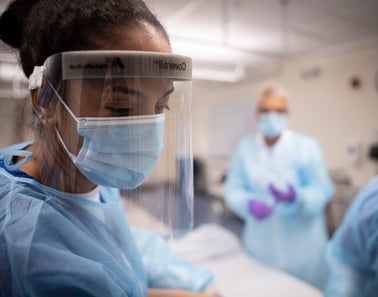Choose 1 of 3 options below:
THE 2050: Religions of the World
In an increasingly interconnected world, and especially in the religiously plural context of the United States, it is crucial that healthcare professionals become acquainted with the beliefs and practices of people from the diverse religious traditions that make up the American landscape. This course examines the world’s religious traditions and, in particular, the ways they conceptualize the person, health, and healing. Study of world religions can offer important and challenging insights into Western medicine. By the end of the course, students will be able to demonstrate knowledge of the basic concepts, beliefs, and practices of a variety of religious traditions; analyze primary sources drawn from religious traditions, such as sacred texts, images, ethical and dietary codes, first-person accounts, and the like; make comparisons between religious traditions based on evidence from primary sources; and use a variety of tools (online databases, journals, books, newspapers, web sites) to develop and research questions regarding the connection between a particular religious tradition and healthcare issues. Because one of the aims of the College is to prepare health professionals for evidence-based practice, research skills are reinforced in this class.
OR
THE 2070: Christianity
Christianity is concerned primarily with the life, teaching, and historical setting of Jesus of Nazareth. This course also investigates the development of the New Testament and the subsequent development of the Christian faith, including the early Christian period, the Middle Ages, the Reformation, and Christianity in the New World. The Eastern and Western Churches and the Protestant tradition are examined. Upon successful completion of the course, students will be able to describe the important religious and political themes at the time of Jesus, identify significant historical figures in the 59 Christian story, and comprehend the different elements which led to the development of the Christian faith within the Roman Empire. Critical-thinking skills and evidence-based practice are introduced and reinforced.
OR
THE 2090: Dying in the Human Life Cycle
This course is a critical academic exploration of issues surrounding the human experience of death. The course examines the topic of death through information gathered from the medical, psychological, social/cultural, theological, and visual arts perspectives. These diverse approaches to the dying process will be analyzed as they pertain to what happens in the lives of patients, their families and friends, those who accompany the patients, and healthcare providers. Current issues and materials concerning the topic of death and dying will form the foundation for class discussion and reflection. As a course in theology, analysis of the dying process will be situated within the Catholic framework of emphasis on the inherent dignity of the human person. Special attention will be paid to the Ethical and Religious Directives for Catholic Health Care Services, 5th Edition, in order to explore ways human dignity flourishes and diminishes within the contemporary milieu as it pertains to end of life issues. Upon successful completion of this course, students will be afforded the opportunity to identify relevant concerns about the end of human life through informed personal reflection; develop and articulate an informed approach to death and dying as they impact healthcare delivery; and describe and evaluate the Roman Catholic Church’s moral stance on end-of-life issues.

